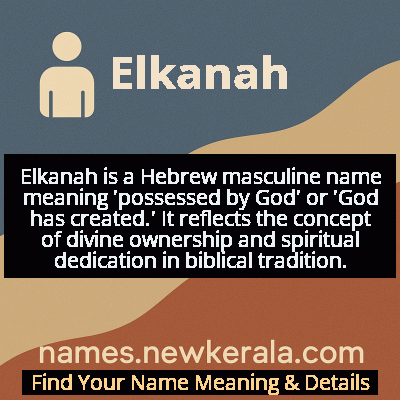Elkanah Name Meaning & Details
Origin, Popularity, Numerology Analysis & Name Meaning of Elkanah
Discover the origin, meaning, and cultural significance of the name ELKANAH. Delve into its historical roots and explore the lasting impact it has had on communities and traditions.
Name
Elkanah
Gender
Male
Origin
Hebrew
Lucky Number
7
Meaning of the Name - Elkanah
Elkanah is a Hebrew masculine name meaning 'possessed by God' or 'God has created.' It reflects the concept of divine ownership and spiritual dedication in biblical tradition.
Elkanah - Complete Numerology Analysis
Your Numerology Number
Based on Pythagorean Numerology System
Ruling Planet
Neptune (Ketu)
Positive Nature
Intuitive, analytical, spiritual, and inquisitive.
Negative Traits
Secretive, reserved, aloof, and can be overly critical.
Lucky Colours
Green, yellow.
Lucky Days
Monday.
Lucky Stones
Cat’s eye, moonstone.
Harmony Numbers
1, 5, 6.
Best Suited Professions
Scientists, researchers, spiritual leaders, detectives.
What People Like About You
Depth of knowledge, analytical skills, spirituality.
Famous People Named Elkanah
Elkanah
Biblical Figure
Father of the prophet Samuel and husband of Hannah in the Hebrew Bible
Elkanah Settle
English Poet and Playwright
Notable Restoration dramatist and poet laureate of London
Elkanah Watson
American Entrepreneur and Agricultural Pioneer
Founder of the American agricultural fair system and promoter of canal construction
Elkanah T. Welch
American Educator
First president of Michigan Agricultural College (now Michigan State University)
Name Variations & International Equivalents
Click on blue names to explore their detailed meanings. Gray names with will be available soon.
Cultural & Historical Significance
In Christian tradition, he appears in genealogies and is recognized as part of the lineage leading to significant biblical events. The name's enduring presence across millennia demonstrates its deep roots in Abrahamic religious traditions and its symbolic representation of divine-human relationships. Beyond religious contexts, the name has appeared in various historical records, particularly among Puritan communities in early America who valued Old Testament names, and continues to be used in modern times by those seeking meaningful biblical connections.
Extended Personality Analysis
Individuals named Elkanah are often perceived as deeply spiritual, principled, and family-oriented. They typically exhibit strong moral convictions and a sense of purpose that guides their decisions and actions. These individuals tend to be reliable, steadfast, and committed to their beliefs, often serving as pillars within their communities or families. Their spiritual nature doesn't necessarily mean they are withdrawn; rather, they often demonstrate practical wisdom and the ability to navigate complex situations with grace and integrity.
Elkanahs are frequently seen as mediators or peacemakers, drawing on their innate sense of justice and fairness. They possess a quiet strength that inspires confidence in others, and their loyalty to loved ones is typically unwavering. While they may be traditional in some aspects, they often balance this with thoughtful consideration of modern challenges, making them both grounded and adaptable. Their name's meaning of 'possessed by God' often manifests as a sense of higher calling or purpose, driving them to seek meaning beyond superficial pursuits and to contribute positively to their communities.
Modern Usage & Popularity
In contemporary times, Elkanah remains a relatively uncommon but meaningful choice, primarily within Jewish communities and among Christians seeking biblical names with deep spiritual significance. The name has experienced modest usage in English-speaking countries, particularly among families with strong religious connections or appreciation for Hebrew heritage. While it has never reached mainstream popularity charts, it maintains a steady presence as a distinctive alternative to more common biblical names. In Israel, the variant 'Elkana' is more frequently used and has gained some popularity as a settlement name, with the town of Elkana in Samaria providing geographic association. The name's rarity in modern times adds to its distinctive appeal for parents seeking unique yet historically grounded names with profound spiritual meaning, though its usage remains niche compared to more popular biblical names like Samuel or David.
Symbolic & Spiritual Meanings
Symbolically, Elkanah represents divine ownership and spiritual dedication. The name embodies the concept that an individual belongs to or is possessed by God, suggesting a life purpose intertwined with higher spiritual calling. This symbolism extends to themes of divine providence, protection, and guidance, representing the belief that one's life is under divine care and direction. Metaphorically, Elkanah signifies being 'acquired' or 'created' by God, emphasizing the sacred nature of human existence and the special relationship between the divine and humanity. The name also carries connotations of stewardship - the idea that those who bear it are caretakers of spiritual values and traditions. In a broader sense, it symbolizes the intersection of human will and divine purpose, representing individuals who navigate their earthly journey with conscious awareness of their spiritual dimensions and responsibilities to both their community and their faith.

